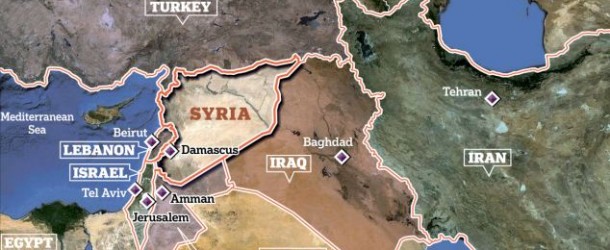The Syrian chemical weapons deal between the United States and Russia appears to be fraught with dangers. There are a number of immediate problems in the wake of the diplomatic breakthrough that the euphoria of backing away of a punitive strike seems to drown out. Key questions involve the process of ridding Syria of chemical weapons, the likely high probability that deadlines will not be met and GCC reactions that still signals the need for containing Syria through military means.
First, the inventory process is unlikely to be thorough. Syria is required to turn over a detailed list of all chemical weapons by November. This undertaking may in itself be a show stopper. Syria possesses tons of various, and in some cases volatile, chemical weapons scattered throughout the remains of the country in over 50 locations. We all need to remember that any sign of Syria breaking its agreement will lead to a punitive air strike against military targets, a possibility that the United States still intends to carry out despite Russia’s interpretation of the bilateral agreement. So any discussion about there never being an airstrike is simply untrue. Unfortunately, this card is still on the table.
Second, inspectors face an extremely hostile environment where it is likely that Syrian soldiers will be providing force protection. Hundreds of specialists will enter Syria with their equipment and disperse across the remnants of the country wracked with a civil war on multiple levels of religious, tribal, and secular violence – an undertaking never attempted before. Whether those Syrian guards are trustworthy remains to be seen as “foreign forces” tear through Syria’s prized military assets. For its part, the United States is offering:
- Chemical weapons-related “personal protective” equipment to international organizations working in Syria, including the Organization for the Prohibition of Chemical Weapons.
- Medical assistance to strengthen local Syrian health care providers’ ability to prepare for and respond to the use of chemical weapons.
- Defensive chemical weapons training and protective equipment to vetted members of the Syrian opposition to protect against the use of deadly gases.
A ruse?
America is offering a positive gesture, yet this intention is likely to run into accusations by Syrian officials as being a ruse for information gathering and intelligence operations, similar to the chemical clean-up in Iraq years before. In addition, Washington’s offer begs the question of how Russia will contribute too to the Syrian chemical clean-up. Rumors are circulating that Moscow has over a thousand special operations forces in Syria guarding chemical sites. If these rumors are true, then a new angle opens for cooperation – or not -across Syria, between the White House and the Kremlin.
Finally, the destruction or transport of the chemical weapons in question is also troublesome due to security concerns in a complex civil war environment. There are key questions unanswered: What chemical weapons will be destroyed in Syria, and will chemical weapons be taken out of Syria for destruction? Can thousands of tons of chemical weapons be airlifted? Can chemical weapons be sent over-land through a civil war? Can these weapons be removed from Syria by cargo ships? How will chemical-laden cargo ships be protected and guaranteed not to suffer an accidental or intentional sinking? Reports are suggesting that two Russian naval vessels out of Moscow’s current fleet deployed in the Eastern Mediterranean are capable of transporting chemical weapons out of Syria.
All of the above drawbacks are seemingly a deep concern to GCC states. Primarily, the U.N. report of the “overwhelming and indisputable” use of sarin via two ground to ground rockets gives the GCC enough evidence, from their point of view, to pinpoint the Syrian military as the culprit. Upon the release of the U.N. report, the GCC denounced Syria’s use of chemical weapons as “irresponsible and inhumane” and a breach of global and humanitarian conventions. Bahrain’s Ambassador to the U.N. in Geneva, Yusuf al-Bujairi, stated: “The development of the Syrian crisis places the whole world before a big challenge which requires the U.N. … to live up to their responsibilities.” He called for adopting “deterrent measures” against those who carried out the purported Aug. 21 chemical attack outside Damascus and called for an end to “genocide.”
Overall, observers and readers need to keep in mind the huge obstacles ahead for the international community in the next few months. The agreement states that if there is noncompliance “or any use of chemical weapons by anyone in Syria, the U.N. Security Council should impose measures under Chapter VII of the U.N. Charter.” The GCC states are well aware of the stakes at hand and still are preparing for the regional dangers that Syria still represents. This preparation appears to include a new push to supply the Free Syrian Army with new, more advanced weapon systems in the past week. To drive the point home, the Saudi Cabinet of Ministers, chaired by Crown Prince Salman bin Abdulaziz al-Saud, deputy prime minister and minister of defense, added that the intransigence of the Syrian government “flows in favor of extremist movements and threatens regional and international security.” It would also not be surprising if the GCC states, who in the past worked with Western partners in chemical weapons clean-up exercises, are updating their capabilities for a worse-case scenario. Clearly, the GCC policy support for factions on the ground, plus other perceived planning, illustrates that the chemical weapons agreement is perceived to be almost unworkable.
Dr. Theodore KARASIK
Kaynak: Newtimes.az
























































